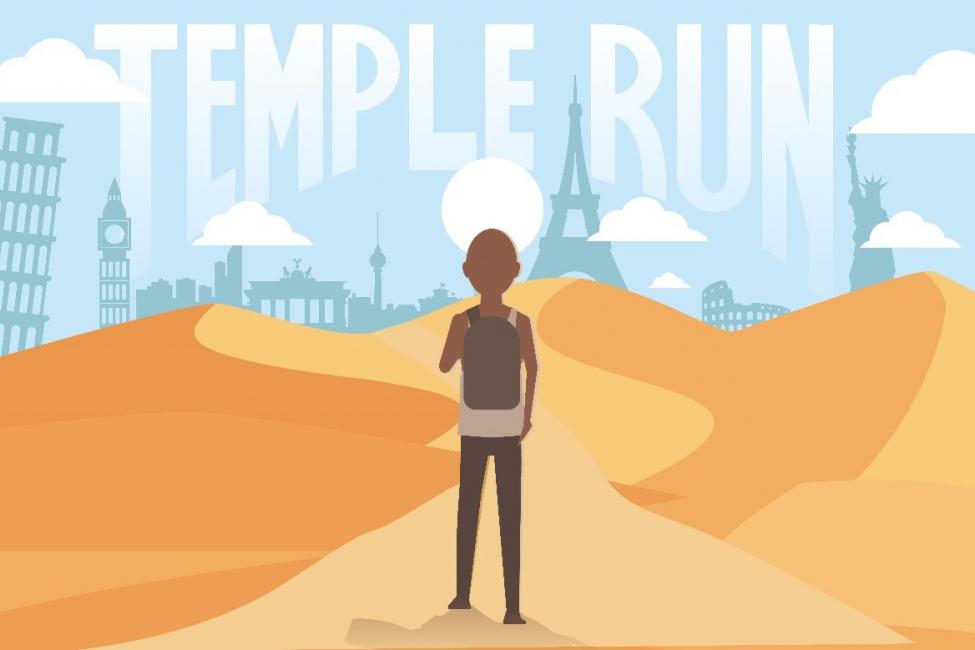In 2020, 26-year-old Abu Kamara (not his real name) sold everything he had to pursue a dream—to migrate to Europe in search of a better life. Twenty-three at the time, he sold off a business he owned and invested up to NLe 20,000 to go on a journey that turned out to be “the most difficult” of his life and only took him as far as North Africa where he is still stuck three years on.
Kamara’s ‘temple run’, as irregular migration is also called in Sierra Leone, took him to neighboring Guinea where he started his journey. He went through West Africa by road, making a stop in Mali and then across the Sahara Desert as he headed for Algeria. Kamara said he almost lost his life on the way due to the harsh desert weather.
“That journey was the most difficult experience of my life…I have never seen anything like that”, Kamara told Engage Salone in an interview via WhatsApp.
“In Guinea, I had nowhere to sleep. I slept in the open for two days before we left for Mali in a Peugeot car”.
When he said “we”, Kamara meant everyone in the car, apart from the driver, was on the same journey. They were leaving home to endure the perils of the desert, with the hope of eventually finding a better life on the other side of the Mediterranean Sea, Europe.
“There are all sorts of risks on the way—from gangs of bandits to other unforeseen risks”, he said.
It took Kamara and his co-travelers three days to get to Algeria from Mali. By the time they arrived, he had lost everything on the way. “There are all sorts of bad people on the way and the least they can do to you is to take your belongings and let you go.”, he told Engage Salone.
According to Kamara, travelers are beaten up by bandits and women are subjected to sexual abuse, including rape. “You have to be lucky to make it alive”, he said.
When Kamara arrived in Algeria, he faced a fresh set of challenges. Immigration issues meant that he risked deportation to Sierra Leone. For him, that would have been a huge setback because all the money he had spent on the journey would have gone down the drain.
Since then, Kamara has made two attempts to go across to Italy from North Africa by boat. They were intercepted at sea and sent back on both occasions. Recently, a boat Kamara was travelling on was sent back to Algeria by Italian coast guards. One of his friends, another Sierra Leonean man from Kenema, drowned when their boat capsized as they made their way back. “We tried our best to save him, but we could not,” Kamara told Engage Salone. That was the second friend he had lost on the journey, he said. Another Sierra Leonean friend of his fell off the vehicle as they were speeding through the desert from Mali to Algeria.
“We tried to rescue him, but we couldn’t…we were even attacked”, Kamara said.
As he recounted the loss of his friends in the Mediterranean Sea and the Sahara Desert, Kamara remarked that “this journey is not only painful but also full of sorrow”.
A lot of families in Sierra Leone have lost their loved ones to “temple run” as more young people continue to make the dangerous trip across the desert and the seas to escape poverty, misery and uncertainty at home. For most who die on the road, their families do not get to bury or mourn them properly.
Mariatu Bangura in her late 50’s, mother of three, lost her only son to the same dangerous journey that Kamara is on. Her 28-year-old son died at sea when their boat sank near Greece. Since the day she got the news of her son’s passing, Mariatu’s life has not been the same, she said. “That day was the saddest for me and my family. We received a message via WhatsApp, informing us that our only son died when their boat capsized on their way to Italy.”
Mariatu and her family have still not recovered from the shock and grief. “His father and two sisters have not been the same. We all miss him, and we pray that Allah have mercy on him”, she said.
There are many parents like Mariatu who are still coming to terms with the loss of their sons and daughters who have perished on the “temple run”.
Despite these stories, many young people are still prepared to take the risk. Like a gamble, you either win or lose and the loss, in this case, can be your dear life. Many young people, despite these stories of suffering and death, still want to take a gamble because winning for them, changes their life forever. Alusine Jalloh lives in Freetown. He has plans to make the journey. He knows the risks, but still thinks that it is worth taking.
“’I know many people have died on the ‘temple run’ but I still want to try it because I know that if I succeed, my life will change forever”, he told Engage Salone.
The International Organisation for Migration (IOM) has been supporting the repatriation of Sierra Leoneans trapped on the migration trail in North and Central Africa. Last year, a record number of 2,200 voluntary returnees were flown in from Mali, Niger and Mauritania—the three main transit countries for Sierra Leoneans on “temple run”.
The head of IOM in Sierra Leone, Christos Christodoulides said they have been working very closely with the government and other agencies to help curb irregular migration flows from Sierra Leone.
“It is a reality in the context of Sierra Leone that many young Sierra Leoneans, mostly male, do leave [the country] on an irregular basis”, Christodoulides told Engage Salone. “Unfortunately,” he said, “they leave without proper documentation”.

There are two main irregular migration routes in West Africa, according to the IOM. There is one that goes through the Canary Islands to Spain. That is not a common route for Sierra Leonean migrants. There is also what is called the “Central Mediterranean route”, going through Niger, and Algeria and then crossing into Europe. According to the IOM chief in the country, that is the route many Sierra Leoneans use on their irregular migration journey. A third route that is also “sometimes used by Sierra Leoneans” is the one that goes through Tunisia and Libya.
Lack of opportunities is one of the major drivers of irregular migration in Sierra Leone. To help address that, IOM’s Christo Christodoulides said youth empowerment is a key area of focus, adding that they were working with the government to provide better opportunities for young people.
Part of what the UN migration agency says it does for returnees is to help them reintegrate through skills training and starting a business. But this does not seem like what Abu Kamara would want to come back to after three years of trying. He is determined to keep trying, despite two botched attempts across the Mediterranean and it has been three years since he left Sierra Leone.
Kamara is now in Tunisia where he hopes to make another attempt to cross over to Europe.
‘’My dream is to eventually cross to Europe to live in either Italy or Germany and have a better life,” he told us.
“I am determined to do anything that would change the lives of my family back in Sierra Leone and I will keep trying”, he said at the end of our interview with him.
Kamara believes that he will “achieve his dreams one day”.
Just like Abu Kamara, a lack of opportunities at home and the hope of a better life elsewhere push a lot of young Sierra Leoneans to the Gulf. Mostly women, they leave their country to look for better opportunities but end up with only one difficult choice—to work as domestic workers, under very harsh conditions. Many reports have documented stories of abuse, exploitation and in some cases trafficking, as these young women seek greener pastures in the oil-rich Gulf countries such as Kuwait, Oman, Qatar and also Lebanon which has had its fair share of economic and political challenges recently.
Last year, Do Bold, an organisation that works on issues affecting migrant workers, carried out a study that revealed disturbing accounts of the treatment of women domestic workers from Sierra Leone, in Oman. Mapping Her Journey tells stories of forced labour, and “experiences consistent with trafficking”
As the cost of living continues to soar and no real prospects of a matching increase in job opportunities in Sierra Leone, experts predict that more young people are expected to make the perilous journey across the Sahara and Mediterranean, hoping to get to Europe. When this happens, there will be many more Abu Kamaras, who go through hell to go to Europe but probably never get there, and many more Mariatu’s who are left behind to grieve as they lose their children to “temple run’.
Note: As we were publishing this article, we learnt that Abu Kamara (not his real name) left Tunisia on another attempt to get to Italy.
About The Author
- Ishmael Sallieu Koromahttps://staging.engagesalone.org/author/ishmael-sallieu-koroma/
- Ishmael Sallieu Koromahttps://staging.engagesalone.org/author/ishmael-sallieu-koroma/
- Ishmael Sallieu Koromahttps://staging.engagesalone.org/author/ishmael-sallieu-koroma/


